- Home
- Anna McPartlin
The Last Days of Rabbit Hayes Page 2
The Last Days of Rabbit Hayes Read online
Page 2
‘Sounds repulsive.’
‘Bite your tongue. We’ve got the best chefs this side of the Liffey here,’ Michelle said, with mock disgust, then smiled. ‘You need anything – a back rub, a foot massage, a manicure, physio for that leg of yours – ring your bell.’
‘Thanks.’
‘You’re welcome.’ She opened a window and left Molly to attend to her daughter’s bedclothes.
When Molly had finished, she went back to the recliner, sat down and watched as Rabbit’s eyes flitted between open and closed. ‘Davey’s on his way home, love. He’ll drop in later if you’re well enough,’ she said.
‘That’s nice.’ Rabbit was asleep almost before the words were out of her mouth.
Johnny
The past and Johnny often waited for Rabbit in sleep. That afternoon, in her dream, he was sixteen, tall, beautiful, his soft curly brown hair resting on his shoulders. She was her younger self, and twelve-year-old Rabbit was a very different-looking girl from the paper-thin ghost that lay in the hospice bed. She was tall for her age but so thin her mother worried that the large space between her legs would affect her gait. ‘Walk in front of me, Rabbit,’ she’d say, and then to her friend Pauline, ‘Do you see what I’m sayin’, Pauline? A toddler could jog through that gap.’
‘Ah, not to worry, Molly. She’ll fill in,’ Pauline said, and she was right. Rabbit did fill in, but not for another three years, despite everything Molly cooked, baked and roasted in duck fat to add weight to her youngest child. Back then, Molly’s mantra was a simple one.
‘Rabbit, eat more. Grace, eat less. Davey, stop picking at your nose.’
Grace would complain and talk about unfairness, but Molly wasn’t interested. ‘You’re big-boned like your ma. Big bones equal small servings, so if you want to be your best self, live with it.’
Grace would continue to complain, but Rabbit didn’t feel sorry for her because, back then, when Rabbit was still so gawky, Grace was a real beauty. She had hips, breasts and luscious lips. She was a proper brunette with emerald-green eyes and, aged eighteen, Grace was a woman while Rabbit was still a child. Rabbit would often stare at Grace and wish, If only I could lose me eye-patch, fill out a bit, darken me hair and plump up me lips. If only I could look like me sister.
The eye-patch was gone by the time she’d hit ten but Rabbit, although beautiful in her own right, would never look like her sister. Her poor eyesight didn’t help: the dark brown horn-rimmed spectacles dwarfed her tiny face. They were heavy and slipped down the bridge of her nose, so she spent a good deal of her time pushing them up. Sometimes, when she was thinking hard about something, she placed a finger on them, holding them tight against her face and scrunching her nose. Johnny was the first to call Mia ‘Rabbit’. She insisted on wearing her long mousy brown hair in two high bunches at either side of her head. To him, those bunches looked like rabbit’s ears and, with her glasses, she reminded him of Bugs Bunny in disguise.
Unwittingly, Johnny Faye was a trendsetter. If he decided patches were cool, within days everyone for miles wore patches. If he liked coats worn open and down to the ankles, or short silver jackets or woolly hats with diamonds, they became trendy without so much as a peep from the lads. It was simple. Johnny was cool so anything Johnny did, said or wore was cool. And when he coined the name Rabbit and Mia Hayes happily answered to it, everyone had followed suit within a week, including her own parents.
In Rabbit’s dream, Grace was dressed to the nines in a tight black dress, heels and big red lips. She was going out with a man she’d met at the disco and it was exciting to watch her get ready. Rabbit liked to sit in her room as she applied her makeup in the mirror. Grace didn’t mind, so long as Rabbit didn’t talk. Grace would turn the tape deck on her dressing-table up high and sing along to Bruce Springsteen’s ‘The River’, then Lloyd Cole and the Commotions’ ‘Brand New Friend’. She’d play them on repeat and, instead of wasting her own time holding down the rewind button, she’d make Rabbit do it.
‘Stop. Play. No. Rewind. OK, stop. No, rewind. Too far – go forward,’ she said, as she painted her eyelids. Happily Rabbit obeyed, pressing the buttons while her big sister transformed herself from beautiful to exquisite before her very eyes. Afterwards Rabbit followed Grace down the stairs and into the kitchen to where her brother Davey was eating his dinner with his earphones on. Davey always liked to eat alone. He’d wait until everyone else was done, then Ma would heat up his plate, he’d put on his earphones and shovel the food down his neck in the time it took to play two songs. Grace said goodbye to Ma and shouted the same to Da in the back room, watching the news. She didn’t bother saying a word to Davey because he wouldn’t have answered anyway.
Davey was sixteen, tall and skinny, like Rabbit. He had long, mousy brown hair, which hung past his shoulders. Despite incessant slagging from the lads, he insisted on wearing denim on denim. He sat chewing and rapping his knife on the table in time to the music playing in his ears.
Molly called after Grace, ‘Ask him for tea on Sunday.’
‘No way, Ma!’
‘I want to meet him.’
‘Not yet.’ Grace grabbed her coat.
Molly appeared with pink rubber gloves on. ‘Don’t make me track him down.’
‘Jesus, Ma, will you let me live?’ Grace opened the front door and sashayed down the path towards the little iron gate.
Molly sighed and headed back into the kitchen, but Rabbit followed Grace outside to where Johnny was sitting on the wall, playing guitar and waiting for her brother to finish his dinner. Grace said, ‘Hi,’ and he smiled at her, but, unlike the other boys’, his eyes didn’t follow her down the road. Instead he focused on Rabbit and patted the wall. ‘Rabbit,’ he said, and she sat down beside him.
‘Johnny.’
‘You look sad.’
‘I’m not.’
‘You are.’
‘Not.’
‘What’s up?’
‘Nothing.’
‘Tell me.’
Rabbit’s eyes started to fill with big fat stupid tears and she couldn’t work out why. She really hadn’t known she was sad until Johnny had said it, and it was all a bit of a shock.
‘Spit it out,’ he added.
‘I wish I looked like Grace,’ Rabbit whispered, embarrassed.
‘No, you don’t.’
‘I do.’
‘Don’t.’
‘Do.’ Rabbit felt a little sulky but then Johnny grinned at her, and when he grinned the skin around his big brown eyes wrinkled slightly. It made her feel warm inside and out. Her cheeks flushed a little and her tummy flipped.
‘When you’re Grace’s age, you’ll be the most beautiful girl in Dublin, Rabbit Hayes,’ he said. ‘There’ll be nobody else quite like you.’
‘Liar,’ Rabbit said, biting her lip to curtail a spreading wide gummy smile.
‘Truth,’ he said.
She couldn’t think of anything to say so she punched him playfully on the arm, then pushed her spectacles onto the bridge of her nose and held them there while he played his guitar and sang a funny sweet song to her.
Jay, Francie and Louis arrived as Davey came out of the house. Jay and Francie, twins, were Johnny’s next-door neighbours, the heart and soul of his band. Jay played bass and Francie played guitar. It was Jay who had fought for Davey to be drummer after his audition hadn’t gone as planned: he was battling severe stomach cramps and shat himself halfway through the second song. Jay was blond, Francie was dark, and they were both handsome, with short hair, square jaws and a big build. They were also talkers: if they hadn’t chosen music, they could have been a pair of comedians in the morning – at least, that was what Rabbit’s ma always said. Louis was smaller and more serious. He played keyboards and fancied himself as the band leader, although nobody really listened to him even when he threatened to quit, which he did at least once a week. Once Rabbit had watched him lose it in the garage.
‘We could really have something here if yous would all s
top mucking around,’ he’d shouted.
‘Stop crying, Free Fatty,’ Jay had said. Louis wasn’t fat, just short and blocky. Francie had observed that he looked like a thin guy who’d eaten a fat one. Since then, much to his annoyance, the lads had insisted on calling him Free Fatty. It was harsh, but not as harsh as Davey’s nickname. Back then, Davey was so thin his hooked nose looked too big for his face. After his audition, when he was walking out of the door with a load in his pants and four fellas crying tears of laughter, Jay called after him, ‘Here, Big Bird, come back when you’re cleaned out.’
‘Big Bird? He looks like a dead fucking bird,’ Francie said, and the twins had called him DB ever since.
Davey didn’t like Rabbit hanging out with the band, so he was quick to tell her to get lost. The lads liked to sit on the wall, chatting, catching up and watching the girls go by before they went into Davey’s garage to practise for a few hours. Davey’s parents were really supportive of the band. His da was a big music fan and his ma was a fan of anything that didn’t include her son washing dishes for a living. Davey got himself thrown out of school when he was thirteen by punching a geography teacher in the face when he’d tried to drop a hand down his pants during a detention. At the time Davey wouldn’t say what had driven him to such an extreme, and word passed around the local schools that his attack had been unprovoked. When no local school would take him in, he had discovered his passion for music. Davey’s first set of drums was a phone book he practised on morning, noon and night, and from the start it was obvious he was gifted. For his fourteenth birthday his da arrived home with a beautiful red drum kit and Davey was so happy he burst into tears. When he played that evening, his parents agreed that, whatever it took, they’d get him to where he wanted to go.
When he joined the band, Davey’s parents could see that they had something – good songs, good musicianship, good work ethic – but, more than that, they had Johnny Faye. If ever a star was born, it was Johnny. He was the real deal. Davey’s da spotted his potential the first time he watched their acoustic set in the local hall one Sunday afternoon. That night they cleaned out the garage, put in heaters, then lined it with egg boxes and heavy draping to soundproof it. Two weeks later, Davey became Kitchen Sink’s new drummer; his family’s garage became their official rehearsal room, Molly and Jack Hayes their biggest supporters.
From the start Rabbit loved being in the garage with her coat and gloves on, watching the lads play and listening to Johnny singing. She’d sit quietly in the corner for hours, so quietly that, hidden behind draping, amps and an upturned sofa, they’d often forget she was there. Sometimes she read a book, others she’d just lie on the floor and listen to them play, banter and laugh. Rabbit could listen to Johnny sing all day. He had such a cool, clear, sweet, sorrowful voice, and despite her brother’s many attempts to get rid of her, Johnny always stood up for her.
‘Let’s take it from the bridge. One, two, three . . .’
Rabbit loved it when her brother counted in before hitting the drum. She loved the bass and guitars kicking in, then Johnny’s voice, giving her goose-bumps and making her spine tingle.
Rabbit spent half her childhood in that garage, listening to her brother and his band rehearse and dream. They were going to make it. After all, one of the lads from U2 had grown up down the road and they were filling stadiums in the USA. It was a sign and, like the lads often said, soon Kitchen Sink would make U2 look like a bunch of bleedin’ amateurs. And Rabbit had been there from the beginning, lying on her duffel coat on the cold hard floor while Johnny Faye sang just for her.
Now the past was so real it sometimes felt more real than the present. It might have been the opiates or perhaps it was because Rabbit was so tired when she was awake that her mind only became energized in sleep. And when she was awake she had to face the truth of her situation. Two weeks ago she had been living with cancer; now they were telling her she was dying and would leave behind her twelve-year-old daughter. Nah . . . I’m just tired. I need a few days to rest and I’ll feel better. I’m not leaving Juliet. No way. Not happening. She couldn’t face it. She couldn’t talk about it. She couldn’t accept it. Instead of forcing herself awake and into the present, she remained in the past, listening to Johnny Faye sing his heart out.
Davey
Davey hadn’t slept for more than four hours straight in at least twenty years. That meant it was easy to talk to the family on the phone or Skype, no matter what time zone he was in. He had been playing poker on the tour bus when his mother had called four years ago to tell him his sister had breast cancer. He came home just after her mastectomy when she was hopeful that it had all gone. After chemo and radiation it was gone, but only until the second call had come three years later. He was just about to go on stage when his ma had told him tearfully that it was back in the other breast and in her liver. He’d flown home immediately. Things were bleaker, but Rabbit Hayes was nothing if not a fighter. She would get better, and if she didn’t, the medication would help her manage the cancer. That time, he’d stayed for three weeks, until Rabbit had demanded he go back to work.
‘I’m not going anywhere,’ she’d promised. Besides, he couldn’t let his drum tech step in for ever. ‘What if they realize he’s better than you?’ she asked, and laughed.
‘Funny,’ he said.
‘Go back to your bus,’ she told him, and they hugged. Even though she pretended not to cry, his shoulder was damp when they parted.
That third call, four months back, had taken his breath away. It was in her lungs but there was still hope. She’d see him at Christmas. He wasn’t to worry. She had years in her yet. The last call had come when he was lying in bed in a hotel room in Boston. He was just about to hop into the shower when he saw his ma’s name appear on his vibrating phone. He considered not answering, but then he remembered . . . Rabbit.
‘Hey, Ma,’ he said, but she was silent. ‘Ma?’
She couldn’t speak. All he could hear was her muffled sobs and he knew. He remained sitting on his bed in silence, listening to his mother cry. He didn’t move one inch. He didn’t say one word.
‘It’s in her bones,’ Molly said eventually. ‘She fell in the kitchen – Juliet found her. It’s really bad, son.’
‘I’m on my way, Ma.’
Then his mother had said the most frightening word he’d ever heard: ‘Hurry.’
For ten years Davey had been drumming for a successful female country singer. He divided his time between Nashville, New York and a tour bus. Casey was a Grammy-winning artist and the mother of two boys. When she was recording he lived in Nashville; when she was on tour, he was on tour; when she took some time off he headed to his place in New York. Davey often worked with other bands if they were stuck for a drummer and Casey was on sabbatical, but she always came first, even if he’d never imagined he’d end up playing country music. ‘Life has a funny way of rolling out.’ That was what Casey had said to him when she’d seen her old friend looking wistful. They were halfway through a gruelling tour and venues weren’t selling out like they used to, so she had a very heavy promotional schedule on top of performing most nights. She was mentally and physically exhausted and the last thing she needed was her drummer leaving her in the lurch.
When he’d knocked on her door and called her name, she’d told him to come in. He found her lying on the sofa in her room with a cold cloth covering her eyes. ‘Another headache?’ he said.
‘Yip.’
‘You need to get that checked.’
‘There’s nothing wrong with me. Hell, it would be a damn miracle if I didn’t have a permanent headache.’ She lifted the cold cloth from her eyes. ‘What?’ she said, sitting up.
‘It’s Rabbit.’ He burst into tears. ‘Oh, God. I’m sorry.’ He was ashamed of the tears but still he cried.
‘Oh, Davey, I am so, so sorry.’ She stood up and put her arms around him.
‘They say she’s dying, Casey.’
Casey soothed him while her
PA booked him onto the next flight home.
‘Don’t you worry about a thing. Stay as long as you need to. We’ll be here waiting when you get back,’ she said, and he was grateful: he’d been in the business long enough to know that, no matter how talented a player you were, if you weren’t a songwriter you were easily replaced. But Davey often under-estimated himself and his role in Casey’s life.
They had met when he worked in a New York music bar. She was a singer-songwriter, while he was bar-tending and looking for a band to play with. She was petite and pretty, and when she sang, even though it was raw, he knew she had something. They made polite conversation a few times and nothing more until one night a guy came on to her at the bar. She politely declined. He pushed anyway. She said no. He asked her if she was a lesbian and she told him she was. He called her something vile and Davey stepped in, warning him to stay away.
‘What are you going to do about it?’
‘You don’t want to know.’
Later he was putting out the trash when he heard a scream. Casey was fighting off the same guy – he’d waited for her outside. Davey knocked him out with one blow. At the time Casey was living in her car but that night Davey moved her into his apartment. She got the bed, he took the floor, and they had been working together ever since, through a lot of rough times. At one point when a second record company had dropped her, he was the one band member who stayed with her. He gave her that thumping sound. ‘I am the C to your DB,’ she often said. To her he was irreplaceable and they were their own kind of family.
She had walked him to the limo that would take him to the airport. ‘I’m with you,’ she’d said. ‘You know I’m with you.’
‘I do.’ They’d hugged it out.
‘Don’t make me miss you for too long, ya hear?’ she said.
He had sat quietly on the plane, didn’t stir out of his seat or engage with fellow passengers; he didn’t sleep or eat or watch a movie, just thought about his sister and that funny, sweet, precocious little girl of hers. What about Juliet? Davey had missed much of his niece’s short life but even as a toddler she had never failed to recognize him. Her excitement on seeing him always made him feel special. Rabbit kept his photo on the wall and spoke about him often, but it had been clear early on that Juliet and Davey had a strong connection. He dreaded seeing her. Poor Juliet.

 alexandra, gone
alexandra, gone The Truth Will Out
The Truth Will Out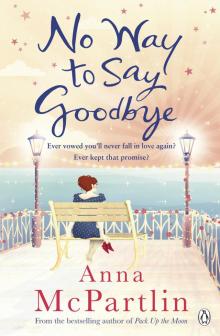 No Way to Say Goodbye
No Way to Say Goodbye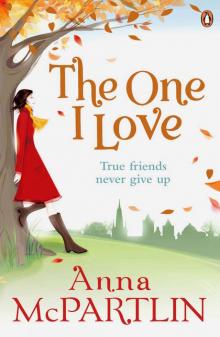 The One I Love
The One I Love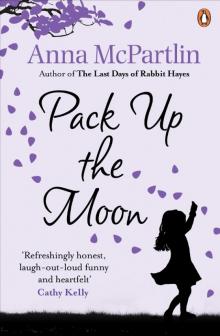 Pack Up the Moon
Pack Up the Moon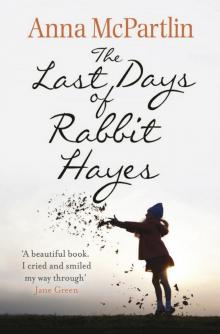 The Last Days of Rabbit Hayes
The Last Days of Rabbit Hayes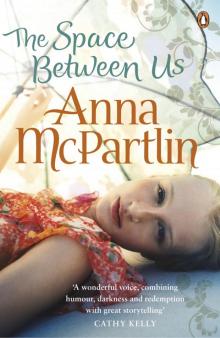 The Space Between Us
The Space Between Us